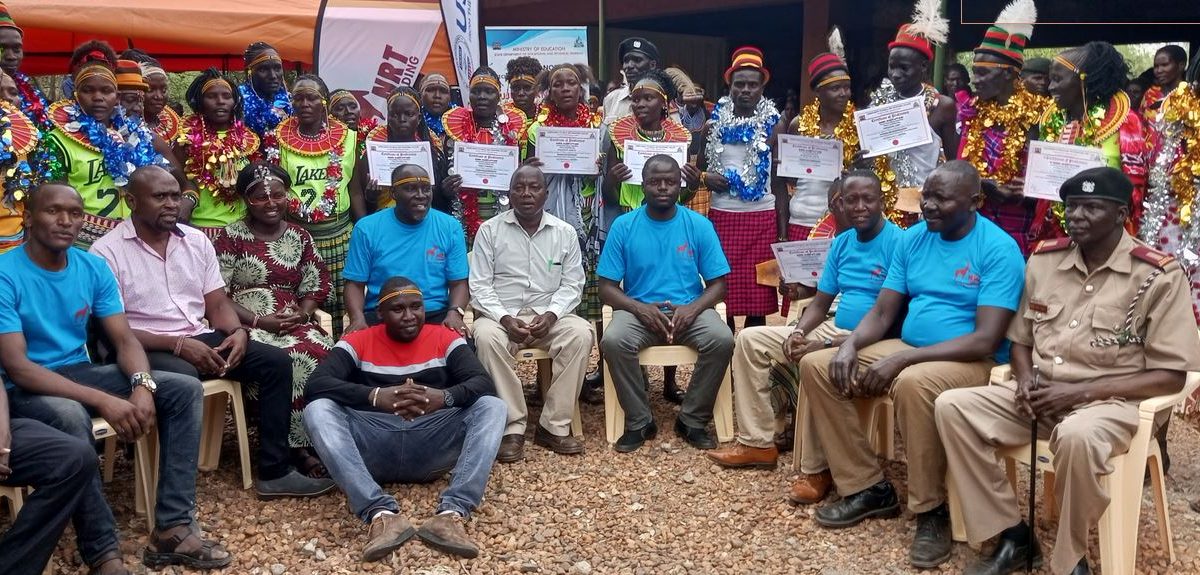People in West Pokot County derived their livelihoods from natural resources such as pasture, water, vegetation and livestock but in the last decades, access to these resources has reduced thereby compelling them to embrace education as a key to success to avoiding a more difficult life.
Education in the region has helped to reduce harmful cultural practices like cattle rustling, and as well as promoting peace and stability.
The Northern Rangelands Trust (NRT) which is a membership organization owned and led by the 43 community conservancies and serves in Northern and Coastal Kenya rolled out a training programme at Masol village in West Pokot County dubbed “Ujuzi Manyattani vocational training programme” to boost education standards in the region.
Through the Ujuzi Manyattani training programme, 30 vulnerable youth and women have graduated in the field of masonry, motorcycle mechanics, mobile phone mechanics, welding, plumbing, electrical and solar installations, tailoring and dressmaking, catering and accommodation, hairdressing, and beauty therapy from Masol ward in West Pokot County courtesy of Northern Rangelands Trust (NRT) Training.
The NRT training programme has enabled 10 men and 20 women from the region to graduate with certificates in vocational courses and they were given equipment to start them off in life.
Speaking during the graduation ceremony held in the Northern Rangelands Trust headquarters in Masol ward in West Pokot County, the NRT West regional Director Kadir Boru noted the programme sought to equip the local community with opportunities to diversify the youth and women livelihoods and help reduce continued poverty and conflict cycle.
Boru clarified that the programme also aimed at enhancing youth and women employment ability and help boost their technical workforce on the community level, county and at large.
“This is a journey to transform the beneficiaries into job creators through business coaching and mentorship for them to set businesses for self-employment and employment of others in their respective communities,” he explained.
He said the training programme scaled up students from Samburu, Marsabit, Isiolo, Garissa, Laikipia, Baringo and West Pokot County and was funded by the United States Agency for International Development (USAID).
He said they choose West Pokot County in order to support youth and women who ordinarily were kept out of formal learning institution due to lack of literacy, distance from educational centres and lifestyle.
“Most young men are mainly entrusted with providing labour through herding animals and homestead security but have limited economic skills and low literacy levels,” Boru said.
According to NRT Ujuzi Manyattani coordinator Peter Nguno, the vocational training programme skills positions youth and women at West Pokot County and Northern Kenya to take on economic opportunities as envisaged in vision 2030.
Nguno explained that since its inception in June 2019, the Ujuzi Manyatta programme has empowered 633 young men and women to acquire vocational skills and take advantage of business opportunities in Northern Kenya.
“The vocational model contributes a long way to Kenyan Government’s ‘Big Four’ agenda that strives to promote job creation for youth and deepen industrialization in forgotten landscapes,” Nguno explained.
He clarified that NRT is a business accelerator for the social and conservation impact enterprises operating in Northern Kenya.
Nguno said they have envisioned to accelerate the development of sustainable and resilience commerce across North Kenya, empowering people, improving livelihoods, conserving nature, and contributing to peace and stability.
Elizabeth Chepoisho, a mother of seven, was among the beneficiaries and she explained how marriage life deprived her of education and opportunities. She trained as tailor.
“I was married off when I was 16-year-old by my parents. I come from remote village, and I didn’t attend school. I went through a miserable life and today I am happy because NRT have given me an opportunity to be trained. The skills I have acquired will enable me operate a tailoring shop and I will have something for my family from the business,” Chepoisho said.
Elijah Kibet, also a beneficiary, trained in solar installation course. He lauded education saying it has helped to transform the residents of Masol ward who used to engage in frequent battles with cattle herders from neighbouring communities of Turkana and Elgeyo Marakwet County.
Kibet said he cherished the skills he has acquired in solar installation in Masol ward where there is no other with a similar skill.
He said his solar installation skills will enable him generate electricity for families who live off the grid in Masol and other parts of the county.
Sigor Sub County Assistant County Commissioner Erick Okacha reiterated that the technical and vocational skills the youth and women acquired will enhance their employability, income and livelihoods.
“These skill sets will enable the students who have graduated to set up businesses and, in the process, help them build a strong entrepreneurial skill,” ACC Okacha reiterated.
The youth and women were trained by tutors from Laikipia North Vocation Training College (TVET).
Laikipia North Technical and Vocation training college Principal Maina Njane affirmed the students who graduated are ready to make a difference in their lives and contribute to the lives of others after successful completing their technical and vocational courses.
Njane argued students who want to pursue Technical and Vocational Training courses but lacked college fees to apply for Higher Education Loans Board (HELB) to complement the capitation offered by government.
He encouraged more students to join TVET Institutions because in TVET institutions, they will be able to acquire skills that are necessary for job creation.
By Anthony Melly



